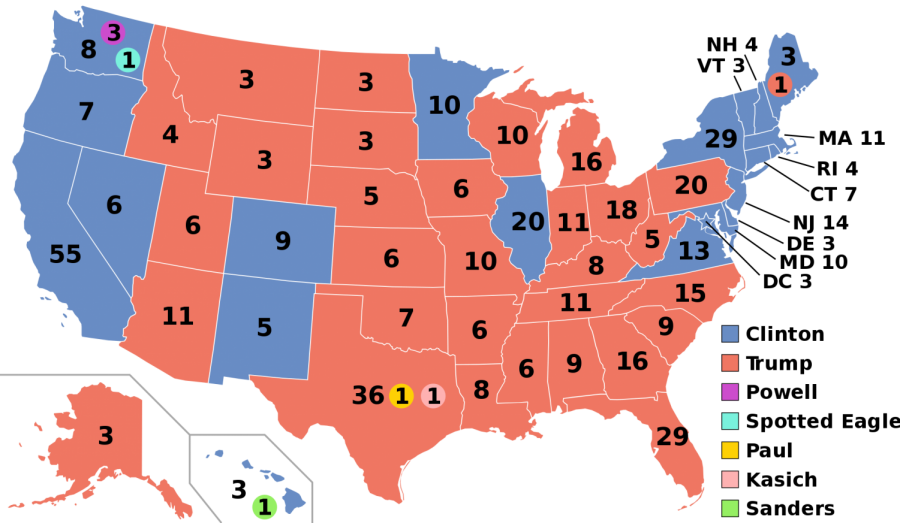A Defense of the Electoral College
August 25, 2019
One of the most important cornerstones of our federal republic, the Electoral College, is as old as the nation itself. The portion of Article 2, Section 1, of the U.S. Constitution that codifies the system of electing the chief executive goes into more excruciating detail than any other single issue in the entire Constitution — more than war powers or taxation.
But turning on the news today, we witness a relentless barrage on this once-cherished institution from those who claim the system is undemocratic and was devised to uphold slavery. While these claimants have their hearts in the right place, their change is not something that would make our Union more perfect. Many of the criticisms ignore the most crucial and common sense reasons why our indirect selection of a chief executive is not only democratic, but a norm amongst developed nations. The Electoral College provides the greater mechanism for stability, competition and clarity in presidential elections compared to a national popular vote.
To address one of the most heated arguments surrounding the College, it was certainly not founded to aid the institution of slavery.
Although electoral votes are partitioned based on the “whole Number of Senators and Representatives” of each state, in 1787, the number of representatives was calculated on the basis of three-fifths of the population of “all other Persons” (including slaves). But the Electoral College only reflected these numbers. The dominant slave states would have preferred their slaves counted as five-fifths of a person in order to bolster their number of representatives, so the idea that African Americans being counted as only three-fifths of a person and that the ensuing political effects of this policy were racist misses the forest for the trees.
Interspersed in these oft-told grievances of the electoral college is the view that it is undemocratic, but that hardly holds up either. While it is not found in the Constitution, the phrase “one person, one vote” is so dogmatic in our society that it holds a unique status. Although the Electoral College itself is attacked for skirting this principle, it seems to me that a more logical way of maintaining “one person, one vote” would be the way in which electors are appointed in the first place.
In 2016, Donald Trump won 48.2% of Pennsylvania’s popular vote. In comparison, Hillary Clinton garnered 47.5% of the state’s popular vote, but Trump received all 20 of Pennsylvania’s electors. If all states followed the lead of Maine and Nebraska and split their vote by two on a statewide basis and the rest per each congressional district, I think that we’d hear much less complaining that the College is “undemocratic.”
But besides this point, many nations that do hold first-past-the-post elections, including Venezuela, Botswana and Yemen, are hardly considered beacons of freedom and democracy. In fact, large and favorably ranked democratic nations that are much less ethnically diverse than the United States, like the United Kingdom, France and India, elect their heads of state through indirect means or two-round systems themselves. We are hardly an outlier of large, democratic countries in our means of selecting a chief executive.
Moreover, we are reminded by the Electoral College that our nation’s smaller states oftentimes house functions that outweigh measurements of population alone. Smaller population states host some of our nation’s largest farming communities, most beautiful and well-preserved national parks and destitute Native American reservations. We depend on these states every day for the energy that heats our homes, the gasoline that powers our cars and the food we eat for dinner. If anything, many federal policies affect these states disproportionately to their relatively small populations.
Our Founding Fathers were invested in liberty, not expediency. Nearly all branches and sections of our federal government are prone to gridlock and unresponsive to instantaneous pressures. The Electoral College is no different. It embodies the vision our Founders laid forth. The College prevents, in James Madison’s words, a “tyranny of the majority,” and allows the Founders to posthumously tell us all to slow down.














Keep it real • Oct 5, 2020 at 2:56 pm
I’m glad this is only an opinion. There is not academic value, no primary or secondary sources. The 21st century will be an era of questioning. If you are reading this comment we won’t be here, the next century, to see people laughing at articles like this. It may sound radical, the framers drafted a slave constitution, but in 70 years it will be a matter of fact. Time has a beautiful way of bring the truth out. Stop the dirty little lies.
Susan Anthony • Aug 26, 2019 at 1:23 pm
Maine (only since enacting a state law in 1969) and Nebraska (only since enacting a state law in 1992) have awarded one electoral vote to the winner of each congressional district, and two electoral votes statewide.
When Nebraska in 2008 gave one electoral vote to the candidate who did not win the state, it was the first split electoral vote of any state in the past century.
2016 was the first time one electoral vote in Maine was given to the candidate who did not win the state.
In June 2019, 77 Maine state Representatives and 21 Maine state Senators supported the National Popular Vote bill.
In a March 12-13, 2019 poll, Maine voters were asked how the President should be elected
52% favored “a system where the candidate who gets the most popular votes in all 50 states is the winner.”
31% favored “a system where electoral votes are given out by Congressional district” — Maine’s current method for awarding 2 of its 4 electoral votes